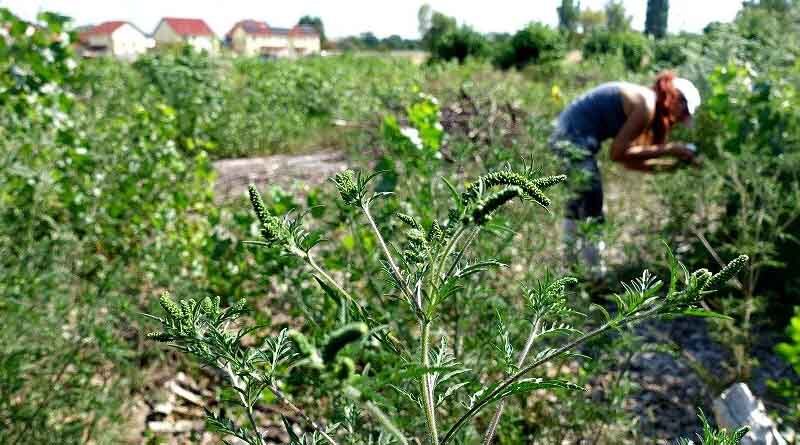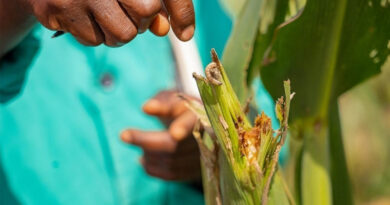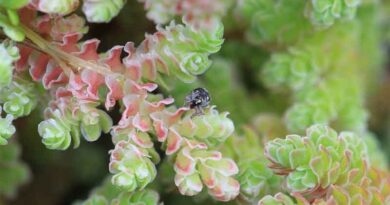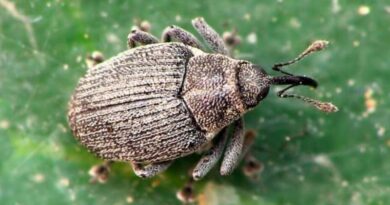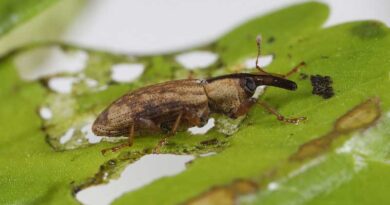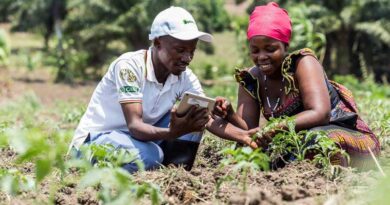PhD student steps up fight against ragweed which is rated world’s fourth most serious invasive weed
20 September 2022, Europe: CABI is co-supervising a new PhD student who is stepping up the fight against common ragweed (Ambrosia artemisiifolia) which is considered the world’s fourth most serious invasive weed.
Common ragweed, which originates from North America, reduces crop yields, shifts flora of natural habitats, and seriously negatively impacts human health. Its pollen causes a range of symptoms from sneezing to itchy eyes and aggravates conditions such as asthma and eczema. It is also a key weed in crop production such as in sunflower.
One biocontrol solution is a leaf beetle, called Ophraella communa, who’s adults and larvae heavily feed on common ragweed whilst reducing its seed and pollen shed. It is a successful biocontrol agent in East Asia, Italy, and Switzerland. Whether it will also perform well in the hot spots of ragweed in Central Europe is unknown.
Dora Ivanyi is conducting her PhD research – to investigate the leaf beetle as a biological control agent for common ragweed – under the Plant Science Doctoral School at the Department of Integrated Plant Protection of the Hungarian University of Agriculture and Life Sciences (MATE) in Godollo in Hungary.
This is being conducted together with CABI’s centre in Switzerland. She is being supervised by weed scientists Dr Zita Dorner and Dr Mihaly Zalai from MATE as well as by CABI’s invasive species experts Dr Urs Schaffner and Dr Stefan Toepfer.
Moreover, global ragweed experts Dr Heinz Mueller Schaerer from the University of Fribourg, Switzerland and Dr Yan Sun, Huazhong Agricultural University, Wuhan, China as well as entomology experts from the Hungarian Academy of Science will also contribute towards supporting Ms Ivanyi’s PhD research.
Scientists from the EU-COST Action on Sustainable management of Ambrosia artemisiifolia in Europe (SMARTER) – which was launched in 2013 with the aim of initiating and coordinating long-term management options to reduce ragweed in Europe – will also play a supporting role.
Ms Ivanyi’s investigation includes ways to understand how the biocontrol agent Ophraella communa will be able or not to reduce ragweed populations under different climates, such as in some of the hot and dry areas of central Europe.
This is of particular interest as climate change – with increasing frequency of extreme weather events – is also hitting Central Europe. She will also study how to enhance existing control attempts – such as cultural control approaches – through the use of Ophraella communa.
Dr Dorner said, “Ragweed is, next to causing human health problems, also the most important weed of wheat stubbles, maize and sunflower in Hungary according to the 6th national weed survey, 2018-19.
“It is important that a viable safer-to-use and more environmentally friendly biological control agent – such as Ophraella communa – is proven to be effective against common ragweed and we support Dora in her effects to research this prospect.”
In the long-term, it is hoped Ms Ivanyi’s research will help reducing airborne pollen concentrations in Central Europe to a similar extent as currently observed in northern Italy. This could relief millions of citizens from the yearly recurring allergic reactions.
Dr Mueller Schaerer said, “The evolvability of a target weed and of its biological control agent, when they interact, needs to be combined with further demographic studies of ragweed and Ophraella across their suitable areas in Europe. This is to identify those regions where a biological-based weed control approach is likely to reduce impacts of common ragweed, and where it needs to be complemented by other management tools.”
The PhD project is financed by the Hungarian state scholarship (magyar állami ösztöndíj) (2022-2026) as well as by ADOPT-IPM: EU-China joint action to increase development and adoption of IPM tools (HORIZON-CL6-2021-FARM2FORK-01-19) (2023 – 2027).
Also Read: FMC Corporation wins patent infringement case in China
(For Latest Agriculture News & Updates, follow Krishak Jagat on Google News)

